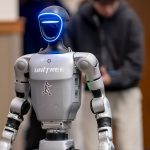The disruptions have started and we have yet to see the Fourth Industrial Revolution really pick up steam as automation, artificial intelligence, and machine learning mature. Whether or not your business will see the impact of those technologies sooner rather than later will depend on several factors.
You should understand some of the differences between those technological terms. Automation occurs when a machine replaces a human employee in completing work. We often think of robotics, especially in the manufacturing context, as the hallmark of automation. Artificial intelligence describes when a machine can respond to an event or situation in the same way as would a human. This type of technology requires humans to code those responses into the machine’s computing system. Machine learning removes the need for human coding. Simply, the machine can learn on its own from repeated exposure to different situations.
Singular artificial intelligence occurs when the combined technologies can execute complex jobs instead of discrete portions of a job. At some point in the not-too-distant future, singularly intelligent systems will be able to load, launch, fly, and land a plane without any human involvement. Of course, this example might not exactly translate to your business, but it should give you a sense of the technological advancements that engineers and software developers have made over the past decade.
How exposed is your business to displacement from technological development?
You might consider the following five factors when making this assessment:
1. Where is your business located? Some parts of the world have grappled with the ethical issues surrounding the adoption of smart technologies more than other parts of the world. In the United States and China, for instance, those nations continue to heavily invest in and implement those technologies. In Europe, however, governments have taken a more conservative approach to regulating these technologies in ways that slow their adoption.
2. In what industry is your business? While the technologies of the Fourth Industrial Revolution will impact every industry, some industries will experience a greater impact. For instance, accounting and financial services have seen robust investment into these technologies over the past decade and will continue to see more investment. Algorithms and bots – even chatbots, web bots, and virtual bots for customer-facing jobs – will reduce the size of workforces in those industries. Even healthcare and medical fields will experience disruption, as smart machines have quickly developed diagnostic capabilities. Transportation, logistics and supply chain, and manufacturing will continue to adopt more technologies.
3. What is the nature of the work done in your company? This can cut across job categories and titles. Repetitive work with standard physical movements and work that includes little autonomous decision-making will get displaced by technology. Jobs with highly variable work requirements, routines, and physical movements will continue to be staffed by human employees. Consider that most of the skilled trades – electricians, masons, plumbers, carpenters, and the like – will not see their work displaced by technology. The cost of developing micro-robots armed with singular artificial technology is too great to displace human work in those fields.
4. How much are you willing to invest now? The efficiency of robotics improves a generation in as few as eight years. Because artificial intelligence and machine learning technologies are younger, generational advancements in those technologies occur every two to four years. Adopting any of these technologies requires considerable investment. The price of robotics continues to fall and because that technology is more refined, companies can use that technology longer. Newer models do not come out every year or two! Artificial intelligence and machine learning technologies, however, will have shorter lives, as advancements in those technologies will render older generations obsolete more quickly.
5. Finally, how ready are your customers for interacting with these technologies? While many customers currently do not know that the web bot they interact with on your website is actually an artificial intelligence application, virtual or hologram bots are on the way. If your customers realise that the customer service representative on a Zoom or Facetime call is actually a hologram bot, how will they react? If your retail store, pharmacy, or even restaurant is completely staffed by artificial intelligence applications – as some stores in China currently are – how will they react? Depending on the particular product, some customers might find the tradeoff between the reduced cost of the service and experience acceptable. One of the more interesting aspects of technological advancement, which the COVID-19 pandemic highlighted, is that humans will pay a premium to experience human interaction. Your customers will have a say in how much and how quickly you adapt artificial intelligence applications.
Regardless of whether or not your business will see the immediate or midterm impact of technologies like automation, artificial intelligence, and machine learning, it is likely that your industry and competitors will adopt these technologies to varying degrees. Your company should, at a minimum, include strategic planning around these technologies even from a risk management standpoint.
About the author:
Anthony Wheeler is Dean of Business Administration, Professor of Management at Widener University and co-author of HR without people? Industrial evolution in the age of automation, AI and Machine Learning.










